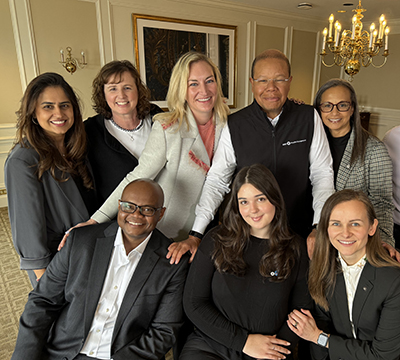BMO releases Wîcihitowin ᐑᒋᐦᐃᑐᐏᐣ– Annual Indigenous Partnerships and Progress Report and provides free access to eLearning to the public
Today BMO launched Wîcihitowin ᐑᒋᐦᐃᑐᐏᐣ (pronounced: wee-chih-hito-win), its second annual Indigenous Partnerships and Progress Report. BMO engages with Indigenous customers, colleagues, and communities across three pillars—Education, Employment and Economic Empowerment—that rest on a platform of Zero Barriers to Inclusion for all. A Nehiyawewin/Cree term meaning “helping and supporting each other”, Wîcihitowin ᐑᒋᐦᐃᑐᐏᐣ highlights BMO’s engagement with and commitment to Indigenous communities with stories from Indigenous customers, employees and community leaders – stories that compellingly illustrate both barriers and opportunities on the path to reconciliation.
Additionally, BMO, together with First Nations University of Canada, is marking this year’s National Day for Truth and Reconciliation by providing an interactive eLearning initiative, Nisitohtamowin ᓂᓯᑐᐦᑕᒧᐃᐧᐣ(pronounced: nis-toh-tum-win), free to the public for the next three years. Nisitohtamowin introduces participants to the fundamentals of Indigenous history: the diversity of Indigenous peoples, treaties and nation-to-nation agreements, residential schools, the Indian Act and the ongoing struggle for economic and social justice.
“We are honoured to share the Nisitohtamowin eLearning initiative, and to launch Wîcihitowin ᐑᒋᐦᐃᑐᐏᐣ, BMO’s second annual Indigenous Partnerships and Progress Report, reflecting BMO’s Purpose to Boldly Grow the Good in business and life. For 30 years, in partnership with Indigenous Peoples and their leaders, we’ve been innovating to deliver customized financial services to further economic empowerment,” said Darryl White, CEO, BMO Financial Group. “The success of BMO’s Indigenous Banking Unit, along with educational initiatives like the Nisitohtamowin eLearning course and the progress we’ve made on Indigenous employment growth through programs like Miikana Career Pathways, inspire our journey to deeper understanding, to advancing reconciliation and to eliminating barriers to inclusion for all.”
This year BMO celebrates the 30th anniversary of its Indigenous Banking Unit (IBU), which has long served Indigenous communities across Canada. Through its network of branches and business banking offices, both on and off reserve, the bank offers financial education programs for Indigenous young people and elders and accessible financial products and services, including housing and renovation financing, trust services, investment management solutions and long-term financing for on-reserve infrastructure and economic development.
“For decades we have grown our Indigenous Banking Unit to help Indigenous customers and partners shape their futures,” said Michael Bonner, Head, BMO Canadian Business Banking, Head, Enterprise Indigenous Strategy. “We strive to be leaders in Canada’s corporate sector in advancing Indigenous economic independence; and the success of the IBU in growing our book of business speaks eloquently of the trust that Indigenous enterprises, communities, and customers have placed in us. Late last year we welcomed Clio Straram as the new Head of the IBU. A seasoned leader, Clio is devoted to Indigenous economic empowerment, which lies at the heart of BMO’s Indigenous Banking Unit.”
Education, Employment and Economic Empowerment: Highlights from the Report
- Together with First Nations University of Canada, BMO has provided an updated online education course, Nisitohtamowin ᓂᓯᑐᐦᑕᒧᐃᐧᐣ, free to the public for the next three years, backed by a $300,000 pledge to the University. Taken from the Cree word for “understanding” Nisitohtamowin provides a short overview of 500 years of colonial history in Canada from the perspective of Indigenous peoples. The course has been completed by 90% of BMO employees to date and almost 10,000 members of the public and is an example of how BMO is translating the spirit of reconciliation into action.
- In further support of education, BMO has earmarked $7.7 million toward awards and scholarships, (up from $5.5 million), out of a total of $16 million in donations and pledges to Indigenous communities across Canada.
- BMO has expanded its efforts to recruit and retain Indigenous employees by increasing the number of remote roles available to Indigenous candidates; creating new internship opportunities for Indigenous candidates in Engineering and Planning and Technology and Operations through a partnership with Amazon Web Services and Plato testing; and through the bank’s Miikana Career Pathways program which provides tailored support to Indigenous employees.
- BMO’s banking services are available to 270 indigenous communities nationwide. BMO has more than $200 million in authorized loans for housing purposes in Indigenous communities, including our On-Reserve Home Loan Program.
- In support of Indigenous businesses, BMO has increased the level of procurement of goods and services from Indigenous partners – surpassing in 2022 its commitment to spend $10 million annually with Indigenous-owned businesses by 2023
- BMO’s commitment to mobilize $300 billion in sustainable financing by 2025 includes lending to Indigenous businesses and communities in the structuring of our Sustainable Bond program.
- For advancing Indigenous interests and economic development, BMO has received Gold Certification in Progressive Aboriginal Relations (PAR) six consecutive times. PAR is a program administered by the Canadian Council for Aboriginal Business.
On September 30, BMO and its employees will join people across Canada in the observation of the National Day for Truth and Reconciliation as an occasion to reflect on our shared history and its impacts and reaffirm our commitment to Truth and Reconciliation.
Read the full report to learn more.
Free Nisitohtamowin eLearning course: www.fnuniv.ca/reconciliation.
For more information about BMO’s commitment to supporting Indigenous communities, click here or visit: www.bmo.com/indigenous-commitments








